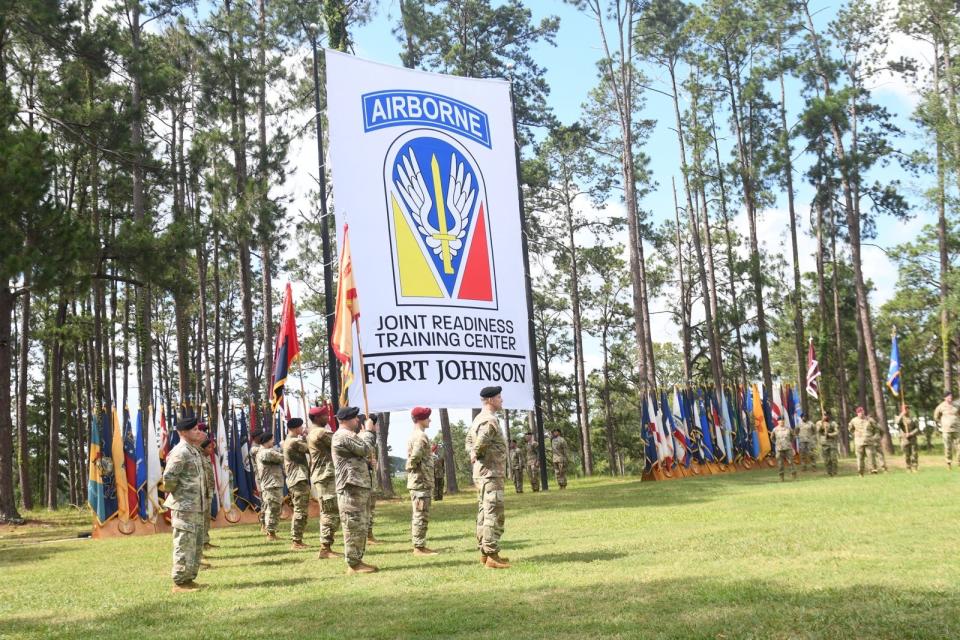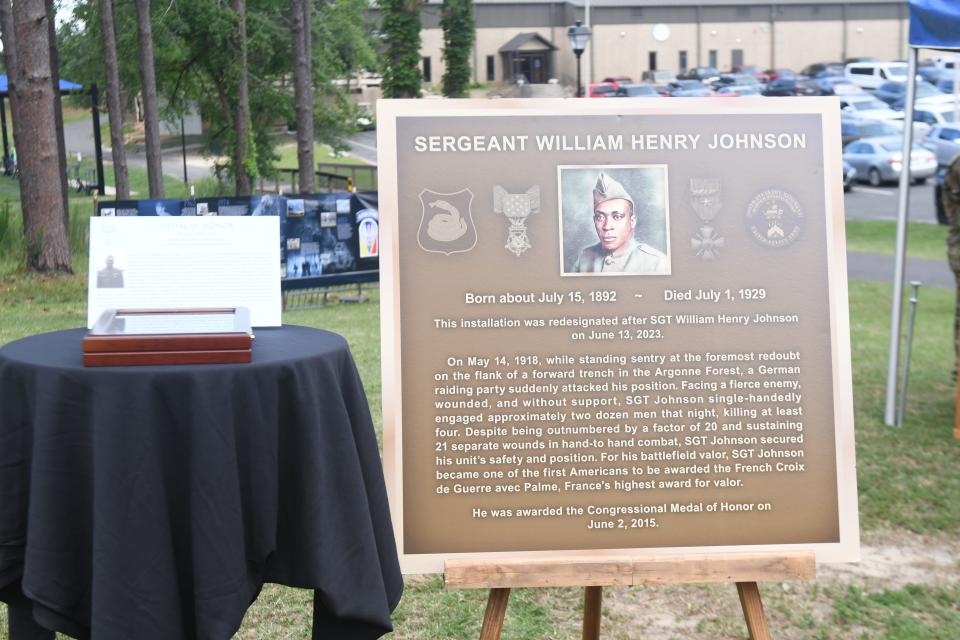Louisiana Army base renamed for Black World War I soldier
- Oops!Something went wrong.Please try again later.
- Oops!Something went wrong.Please try again later.
FORT JOHNSON, La. - A U.S. Army base in west central Louisiana's Vernon Parish was renamed to Fort Johnson in a ceremony Tuesday in honor of Sgt. William Henry Johnson, a Black hero of World War I who was posthumously awarded the Medal of Honor.
His granddaughter Tara Johnson said Tuesday the naming of the base where soldiers come to train to protect the country was more recognition than she ever imagined. Johnson's niece Taylor Gamlin said having such a historical contribution noted and celebrated was an honor for the whole family.
“It’s growth," Johnson said. "It’s growth within our services. It’s growth within our community because now we are focusing on people, being less judgmental, regardless of the color of their skin. It is focusing on service to our country. Nothing else.”
The base, which is home to the Joint Readiness Training Center and the 3rd Brigade Combat Team of the 10th Mountain Division, was previously named after Confederate commander Leonidas Polk. The federal Naming Commission recommended name changes for nine military bases named for Confederates, marking the first time bases will be named after Black soldiers and women
Johnson was injured when he fought off a German night raid while serving on the front lines of France in 1918, according to the National Museum of the United States Army. Former President Theodore Roosevelt named him one of the five bravest Americans to serve in the conflict, but he was not awarded a Purple Heart and the Congressional Medal of Honor until after his death in 1929.
“Sgt. William Henry Johnson embodied the warrior spirit, and we are deeply honored to bear his name at the Home of Heroes,” said Brig. Gen. David W. Gardner, commanding general of the Joint Readiness Training Center and Fort Polk.
Who was Sgt. William Henry Johnson?
An article about Johnson on the U.S. Department of Defense website, says in May 1918 Johnson fought off German soldiers attacking his position near a bridge over the Aisne River at Bois d'Hauzy in France. He suffered 21 wounds in the attack that also left another soldier, Pvt. Needham Roberts, severely injured.
Johnson threw grenades until he ran out and fired all the ammunition he had. When he ran out of ammunition, he charged the Germans swinging his rifle like a club. Using a bolo knife, he also fought off two Germans who tried to carry away Roberts.

When Johnson returned to the States, he was paraded around New York City. His story motivated many Black people to support the war effort.
“But despite the accolades, Sgt. William Henry Johnson was never recognized as an American veteran," said Gardner. "He never received the care for his wounds or any veterans’ benefits such as those we take for granted today.”
Johnson could not find work because he was badly injured during the war. He died destitute in 1929. He was buried with military honors in Arlington National Cemetery.
In 1996, Johnson was posthumously awarded the Purple Heart and in 2002, the Distinguished Service Cross, which was upgraded in 2015 to the Medal of Honor.

Veterans say renaming is important for Black community
Barbara Dashiell-Williams, a Navy veteran who comes from a family with a legacy of military service, said she was "elated" at the renaming ceremony. Her father, the late Charles Smith, was a World War II veteran.
"If my dad were here, he would be here today with a big smile on his face giving a big salute," she said. "This means everything for the African Americans involved in World War I, World War II and all the other wars. The recognition is finally here."
Daenel Vaughn-Tucker, an Army veteran and director of library services at the Central Louisiana Technical Community College, said Johnson's story should be shared because "it is a universal story of strength, courage, and resilience."
“Personally, I believe this is a significant step forward in recognition and healing, especially for the African American community,” said Vaughn-Tucker.
Why were bases named for Confederates?
In order to get support for World War I in the South, some U.S. Army bases were named after Confederate officers as a sign of reconciliation between the North and the South, according to a Department of Defense article.
“It was also the height of the Jim Crow Laws in the South, so there was no consideration for the feelings of African Americans who had to serve at bases named after men who fought to defend slavery,” the article said.
Black residents were left out of the original naming process, and bases were named after soldiers born or raised nearby, no matter how effective they were.
Earlier this month, Fort Bragg in North Carolina became Fort Liberty, and Fort Benning in Georgia was renamed Fort Moore last month. The renaming of military installations, streets and ships must be completed by the end of the year.
Contributing: The Associated Press
This article originally appeared on Alexandria Town Talk: Fort Polk renamed Fort Johnson; honors sacrifice of Black World War I hero

